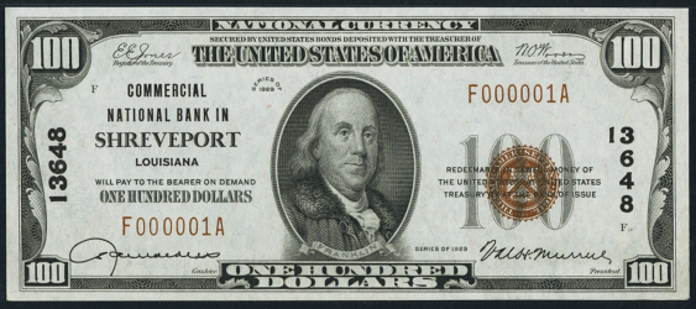One Hundred Dollar Notes › Nationals › 1929 One Hundred Dollar National Bank Notes › Wyoming Charters › 1929 $100 Cheyenne Wyoming Stockgrowers National Bank
Get Value Now
| Item | Info |
|---|---|
| Series | 1929 |
| Charter | #2652 Stockgrowers National Bank of Cheyenne, Wyoming |
| Year Chartered | 1882, 243 Banks Chartered |
| City Info | Cheyenne is the capital and most populous city of the US state of Wyoming and the county seat of Laramie County. It is the principal city of the Cheyenne, Wyoming, Metropolitan Statistical Area which encompasses all of Laramie County. The population was 59,466 at the 2010 census. Cheyenne is the northern terminus of the extensive and fast-growing Front Range Urban Corridor that stretches from Cheyenne to Pueblo, Colorado, and has a population of 4,333,742 according to the 2010 United States Census. Cheyenne is situated on Crow Creek and Dry Creek. The Cheyenne, Wyoming Metropolitan Area had a 2010 population of 91,738, making it the 354th most populous metropolitan area in the United States. Source: Wikipedia |
| Similar Cities | If your note doesn't match try: 1. Cheyenne, Wyoming - First National Bank 2. Cheyenne, Wyoming - Cheyenne National Bank 3. Cheyenne, Wyoming - Citizens National Bank 4. Cheyenne, Wyoming - American National Bank 5. Cheyenne, Oklahoma - First National Bank |
| Seal Varieties | Small Brown |
| See Also | If your note doesn't match try: 1. 1929 $100 Federal Reserve Bank Note 2. 1928 $100 Federal Reserve Note 3. 1928A $100 Federal Reserve Note 4. 1934 $100 Federal Reserve Note 5. 1934A $100 Federal Reserve Note 6. 1934B $100 Federal Reserve Note |
| Other Info | 1. Value depends on notes known for charter, condition and market demand. |
| Neat Fact | Issued in sheets of 6 Note (Friedbergs, 20th Ed. P193) |
No Obligations Offers and Appraisals
Please submit a good photo or scan. It will be identified and evaluated. Understand there may be subtle differences between the image you see above and your note. Signatures, design, markings and note condition will determine the offer price. Notes in Uncirculated or better condition receive the best offers.
Appraisals can be estimated for wholesale and retail prices. Wholesale is what dealers typically pay. Retail is what a collector might pay. Retail is slightly higher in most cases.
Please visit this page for USA Paper Money Reference. Do not treat this page as a reference guide, it is for appraisal and acquisition purposes only.
